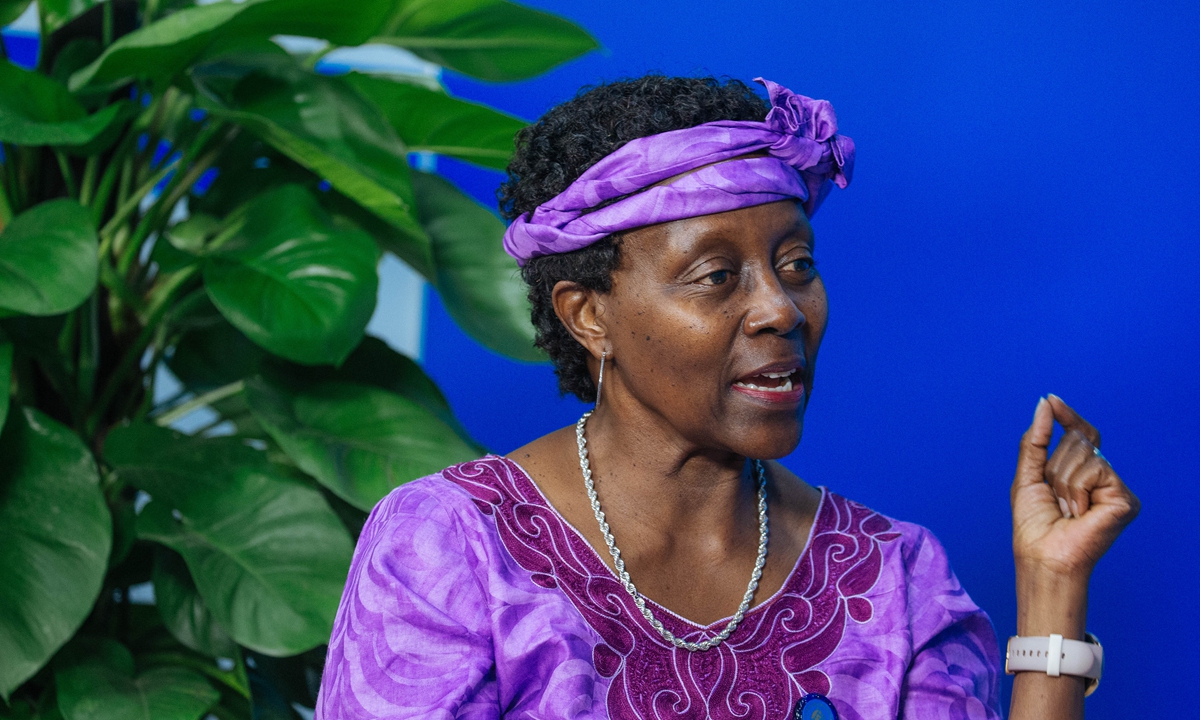First part of COP15 exceeds anticipations; post-2020 framework will be better implemented: CBD executive secretary

Elizabeth Maruma Mrema, executive secretary of the Convention on Biological Diversity Photo: Li Hao/GT
The first part of the COP15 meeting in Kunming has met and exceeded expectations and is expected to provide a roadmap for the effective further negotiations of the post-2020 global biodiversity framework, Elizabeth Maruma Mrema, executive secretary of the Convention on Biological Diversity (CBD) said on Friday, noting that with China taking the presidency of the conference, she looks forward to China's leadership as the world prepares for the second part of the conference next year and negotiates for the post-2020 framework.
Mrema told the Global Times on Friday on the sidelines of the 15th meeting of the Conference of the Parties to the Convention on Biological Diversity, or COP15, in Kunming, Southwest China's Yunnan Province.
Holding presidency of the COP15 gave China the leadership role on biodiversity agenda to ensure that the post-2020 framework is negotiated and becomes an effective blueprint for future actions, she said.
Mrema gave an affirmative "Yes" to a question about whether the consensus reached in the first part of the COP15 meeting and adopted through the Kunming Declaration will make parties form the post-2020 framework which can be better implemented than the Aichi Biodiversity Targets, which was set in 2010.
She said the Kunming Declaration adopted during the high-level segment of the COP15 provided the political momentum and commitment of leaders and China is leading the negotiation which is indeed an opportunity to take the declaration into the framework and later into actions on the ground for implementation.
If measures included in the declaration can remain in the framework and later be implemented by all countries, we should be able to pave the way to reach the 2030 targets for sustainable development and long-term 2050 vision of living in harmony with nature, she said.
The world failed on the Aichi targets for 2020 as only six of the 20 targets in the Aichi targets were partially achieved, according to a UN report.
She said people were worried on how the hybrid format of the meeting would have worked and what kind of commitment would come out before the opening of the meeting, but now people have seen commitments made by various governments and parties including China.
The first part of the COP15 meeting kicked off on Monday when participants reviewed the post-2020 global biodiversity framework to draw a blueprint for biodiversity conservation in the future. The second part, to be held in person in the first half of 2022, will see broad and deepened negotiations toward an ambitious and practical framework.
"Sincerely, the first part of this COP15 has met and exceeded expectations, and we hope this will provide the roadmap for the effective negotiations of the framework," Mrema said.
She said China has played an important role in global biodiversity, and the global target under the Aichi targets was to protect 17 percent of terrestrial areas by 2020, and China has completed 18 percent since 2019, way ahead of the global targets.
"This is a major achievement which the world would want to know what China has done and to learn from and follow suit," she said.
She also listed an example of the recovery of species under Chinese regulations and measures, saying that a number of species have been promoted to a vulnerable group from endangered group.
Following the Kunming COP15 will be COP26 UN climate talks which seemed to receive greater attention than the COP15, she explained that people see draughts, floods, earthquake, wildfires that are connected with climate change, but "we are forgetting when we talk of wildfires, we are talking about forests, which is biodiversity."
"Climate change and biodiversity are interconnected and solutions to climate change alone will not help reduce changes in climate if biodiversity loss is not considered," she said.



